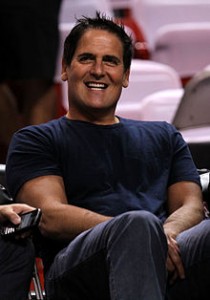 The majority of offseason moves this summer have been completed, and the general landscape of the NBA has settled as everyone prepares for the new season to start.
The majority of offseason moves this summer have been completed, and the general landscape of the NBA has settled as everyone prepares for the new season to start.
For the most part, the traditional powers remain — Miami, San Antonio, Oklahoma City, Chicago — while a few franchises will look to make the leap into elite contention — Indiana, Houston, Golden State, Brooklyn, New York, Los Angeles (Clippers).
Once upon a time, the Dallas Mavericks were a part of this class.
A major part.
Since winning the NBA Championship in 2011, the Mavericks have taken a turn toward the bottom of the league, drifting in and out of the playoff race and far from championship contention.
Mavericks owner Mark Cuban has been at the center of it all, and this weekend, decided to share a bit of insight with the world.
This was fascinating. Loved reading about his thought process these past 2+ years. RT @mcuban: Lets Talk Mavs. http://t.co/wyaQYmIVfA
— Bill Simmons (@BillSimmons) August 4, 2013
Fascinating indeed, and I highly recommend giving Cuban’s entire blog a read when you have a bit of time. A few notable talking points:
Culture is very important to the Mavs. Your best player has to be a fit for what you want the culture of the team to be. He has to be someone who leads by example. Someone who sets the tone in the locker room and on the court. It isn’t about who talks the most or the loudest. It is about the demeanor and attitude he brings. It is amazing how when the culture is strong, the chemistry is strong. When the Mavs have brought in players that didn’t fit or buy in to our culture it created on the court and off the court problems. Its possible to handle one guy who may not fit it. It’s going to have a negative impact on your won and loss record if you have more than one.
Our culture is one of the reasons I won’t trade Dirk.
When you turn your team upside down and try to figure out what the culture of the team is, you take the greatest risk a team can take. Dirk sets the tone for our team. He works as hard, if not harder than anyone. He helps our younger players understand what he expects and what they need to do to excel. On the court he is selfless. He would rather not have to score a point if we would win the game any way. He would rather pass the ball and let anyone else score than be forced to take the shot. Until its the time of the game where we need a point. Then he is ready to step up as often as we need it. But he knows, that his impact on a game is far more important than any averages or what appears in the box score. That mindset. That selflessness. His work ethic is something I want to be in place long after he has retired. But to do that we have to transition with him, not in a void.
Let me address here the inevitable question of Dwight vs Mavs culture. We saw it as somewhat of a risk, but felt like because Dwight by all appearances and checking we did, is a good guy and with our support systems we believed we could make it work. if not, he was obviously a very trade-able asset. But, as everyone knows, we didn’t sign him. He went to the Rockets. I do have to say the meeting with Dwight was very interesting. He is a smart guy. Much smarter than people give him credit for. He is also a very, very good listener. Unlike most people, he spent far more time listening than talking. And he had the best response to an opening question that I have ever heard from a player, or anyone for that matter. When we asked him what his goal was, his response was very specific ” I want to be Epic” .
Ben Baroff is a basketball journalist who blogs for SheridanHoops.com. Follow him on Twitter here.
I wanted to thank you for this good read!! I absolutely enjoyed every little bit of it.
I have you book marked to look at new stuff you post
“I want to be Epic.”
Yep, that sounds like Dwight. Grand statement that can’t be pinned on him later on. Because if he had said,”I want to bring as many championships as I can to Dallas” and then fail to do so, folks would have some accountability on him. So keep it as vague as possible (like his decision making process) so when things go right, he can take credit for it and when they go wrong, it’s not on him.